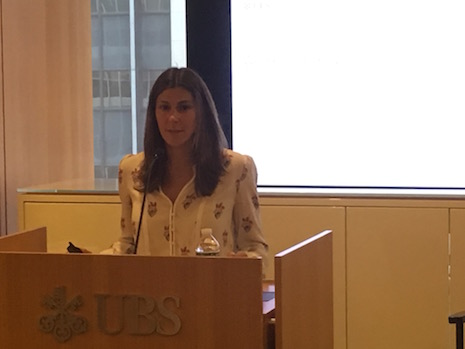NEW YORK – Female consumers control around 30 percent of the world’s wealth, and yet many financial services companies do little to focus specifically on their women clientele.
Speaking at the Women in Luxury conference Sept. 26, an executive from UBS spoke about the ways in which women are a valuable client segment in the financial services industry, and yet continue to be underserved in terms of their specific needs and desires. These wealthy women can be powerful investors if companies take the time to learn what kinds of investments they want to make.
"Women want to invest in organization with diversity in senior leadership, they want to invest in social wellbeing," said Julie Fox, national sales manager at UBS. "The companies that are doing this the best have a great opportunity to capture more female investors."
Luxury Daily produced the Women in Luxury conference on Sept. 26.
Women investors
Women’s share of global wealth is growing every year. As more women make their way up to the top of the world’s biggest companies, women are becoming a significant segment of financial services clientele.
Ms. Fox revealed that 30 percent of the world’s wealth is now owned by women, and yet many financial services companies do not treat women as their own client segment.
In fact, only 2 percent of financial services companies treat woman as an individual segment with their own specific needs.
But this is a huge missed opportunity as women’s importance in the global investment world continues to grow.

UBS' Julie Fox
Part of this disparity can be attributed to a general lack of women at the top levels of financial services companies. If the rate of growth for women in financial services at the C-suite levels continues, the industry will not reach gender parity until 2048.
Women, on a macro level, have investment habits and tendencies that set them apart from other segments which financial services companies can capitalize on.
For example, 77 percent of women want to invest in companies that have diverse leadership and 90 percent want their investments to have a positive impact on social wellbeing.
Companies who share these goals are more likely to receive support from wealthy women investors.
Specialized segment
Philanthropic giving is also an important aspect of wealth management as millennials begin to take control of more of the world’s wealth.
Younger generations of ultra-affluent individuals are impacting the way in which the overall deep-pocketed population gives to philanthropic causes, according to a new report from Wealth-X.
The Giving Index, which draws from data about UHNW philanthropic participation and giving amounts, grew 3 percent from 2014 to 2015 to an all-time high. Wealth-X’s “Changing Philanthropy: Trend Shifts in Ultra Wealthy Giving,” commissioned by Arton Capital, finds that socially- and environmentally-minded millennials are more open to new business models, establishing philanthropy-centric corporate cultures that put giving at the forefront (see story).
But this change of wealth control is not without its own turmoil.

Ms. Fox
The increasing longevity of human life is unsettling traditional notions of responsibility among high-net-worth families, according to a report from Bank of America's U.S. Trust.
U.S. Trust surveyed 800 high-net-worth families and noted some stark changes and disagreements between young wealthy individuals and older ones. These conflicts mainly took the form of what kind of investments they are interested in, their attitudes toward charitable giving and the new problem of multiple generations competing for the same jobs (see story).
If the financial services industry and the companies they represent want to retain the business of women investors, they have to understand them and cater to them as an individual segment.
"Measuring success as a function of profit is too sterile and doesn’t take into account things clients' legacy, what they want to leave behind, what they want for their kids and their personal fulfillment," UBS' Ms. Fox said.
{"ct":"dFJPyONakvYFdT9wls66JExN5TMN\/A7bwtjMZ0yHazd52+AV80\/+jVXdMttTQYckkzQSk4hT\/4M4oqXuNprJ\/Ua9Z+rjnhVGXB9hFivUyg1dsBlQCfSkIqf5Nsg3TXXOv\/nN2ya9SOSki1VxCRluHRC0siGXz4jim3cBTOOWdKEh+8YiWqRjY3zzmmTWIECstuNXahkreKOF2gxX23GJumddIkkcrTGHhoca9GhPJPtYXwKYcC\/kkZZHskoXfXobQvB4iFU6HkAWBlNSQE0cXqtnoBAT\/ANjjNCu2cz0nuP72wvwKjPkdT3xrLFQEXXcTneEHxEOu6qaDhYQ6JY7\/CToHDJ8mRwPV12mb2vuby5tncF45bS2TiSyC4y8gTu25b4PnrhyVYr20ikwncrO5y7LlY1TRz+qXWl\/BIBZZ4cB8dCgxJh6SnlIO5flSF\/3oSGHWwBK0JAxF\/5Z0+KxOQeCVAchv4n8ixnovPD22V9tnJogkBFpAxD+7dBtJhfNdOg8j+lnmCP0girGqs9NRasvJrOHo0aXAderaAcKJ9WWiEDzABbSAHVizsfy06vzmjt2cKRNoqyMeTcaOEZ5vqLsVPXMhYraggHqYi6gc3vjh4+vxkGHpxqzWxJFS7pTdIRyMG9M\/O4+7KNNWY0w3SsCqi9OpAHmy1+uxh8zlGkU4K6sKzsOjxR9dBPsWrTXOrwm8y3dUS423YOWvifA0FJsW0w+HwH+05SNk2+3m6uy8qBsLqOMRyDeAbZCLCNVakJGHy\/nDWt95Y8Ls2HUNckRlio1WplIyyinAiu+UEfD6yCPAYbZ0mlitw1R3asOJgLNzjhnvK3kwYkGhUcqdrB3jkAF4IZ1V+bO2oQV9cOl727s6D5MZm3CGB8qRD2oG4kdLhGK+\/d3PCW6CAV7XGCYxkXx4DS1yk0tRcQG7o38CtgLujYSEPK7Ka\/gdI3Du5qsZYrvnyVd5Ee2RpZP8sfkfIFeigp9YRVW4iWMkgGAiHJFe72TK52ZciEtAH2ZlBYZu2MKVq6pCAPtZwZXpEPPCNZDXV6kmLbGJPwP0EiGzB+s2F1e1hTQfHLdxJMkg37rB+quX5x0TEPlyzOW2GZHewkzkaRrO+r5eTKqund3huM\/tMXHfmrBsFFg2sUoQD5TaBEdbd5wiUdwY4Tbb80zUYQkFNwHBy5rtKfyok7cJ45WjAqcb05HlyhhlPdse9ysTdWhD\/xEN0kmpgVEUdLiKCaoCwIc43iOwn4n4mXNi\/WSjHuDdfGlOeGEPi2LDlqynsxbXkT7y0Vo9ni5pgqYzcMH3tXi0KfAT4ZCgmBkqQdpwteuMsAJZgJWwQcSzCMrRT1HBzH20tP6Ej2YK33QXlmQVRKAxbLaT6cu1ylbVBn4bzpeB5XTIwhPIqiGj\/p3I2gJMbGRFIn+Ht5G8\/LGpPg3wbtLP3UEdpIIqwzkqFzY1PMlansz1LIgkI9JpUf\/SPieFpDcpusBV9pNN1nqyEYomewBgtH004WRVkDxlMfAqL2Wg2YD8lL68MC8bWne5+alseKXz9ZceBhYrA0Ak3W8KBfvIEAtw7sTModwdwhXapdjQ4cSJmpBGL0ZdLuS5foYSh6u2MnfBJFjWFfNo15p\/GPVXbM4bjefjhuiRLh+2Ub8ePNS1AGbvq0KzjHFxmVny62DCLX06zyxDySN6oh5RSUd2oDEv6rvGKDv2Kx3a09J3UTJp5a\/G6ZgPJ4z0sh0I+VsavV6MTpSNFWrh1\/IFePMpPTu\/AgUEv7hyLQ40MV+QoiDV9OkGMOIOXe0Q7SJ4C7Ycr5FQXxWwjtmotXUJdXkxO8EyQnHHlRgKFTw2cS5LnMhzlDKyQlGvzmhR\/GO3fB0S3fsNZEgDNrn86OsmJzfyBV1bQ5yRasjxUvHWgvg641PXnVn1VKIAxQsdX0EFGetiHDfrgR\/QDAt+06F2bfqOxkKWQl36N+wPwtjTTm+IdAVMaTW3e+kd68RkGkLax4murY4mUe4VMZFp5QK6OeFXB3bn1xBK2dQaM3VM8QyeCqIVxVANp0SpHp0vNtIw41Klu6gyuopvDextip4az3Ao8nI318DwupTIMEKwbmOfikqZxvnD2RdUTVhdjEMLnxfRhbyp8zyDas3nOSblrb+QIpgjzZT8EyeZsz80VIwBthN+KLk6Re9sfga6sqie2OmcnmDwwGw16mXbMkh4tipsb\/vVvhr7b91dnRF1ps1Wylr3DNXNk+jwHJp+L5HuJyD5COiDRuLTo2OKUtdKxv5JFJxGDqJjYD\/0fH6tp7I\/CdZiLe9EzMvzGfIR\/FOxuvkFeHL7KliT2DWIEgyOhb5xQoOBM\/IKYtQ2bTb9pKx3kiG9IK9f3QUEgyzvvjwLXapVgJM2zYq4xb3CSPQUeDANAONxPi4wSsFFW9mflM8QoWDsv5a20GUFinrnNQ9ETzOjqRxO\/HMX+8Y+uenrcojQjP0ODh\/Kw2Hy+4sNNnpBRNp6YSJZ1I3JerIMYBCuuGrUJnMqub+9YZJfaqfIrYXr65h51G6c5XYDRSnHPhIjws1SK7yLJiONHp+07cEyrrPHYCvSmod88HhAWJdQ+xHw34\/9lvKg\/\/oIeK+txWA85zsGoFRhVO01YIasAUjWKWlmx88\/e7xE35msS4N4BXMA2mJESpE8WhyI1pSpMFlmv3Dx7tKaD+sz9eziYhNpQV6vrJ0npzf\/B2byG29N+9vJRhAJ0RePkSbgfkjm+FbmQOaek+EjgcY4x1G01E+z7Jhy3znh1bD7PQKt9\/hExVhwMKJWtiKggI1QlghyNqEbHXVjMcchPzCYEZopI9h9ySYMiAbi\/zLIB0e4tCTYp\/Ro\/594EpN9ie8Mk5exaqCmcZTGUlIptmdLtg7xGd\/B0rcU4Ue88i7KX4fAYFTHgY3VvfWJaBGpe5kmEqyfLWEVJIR31jHNXEuJLEU\/K5QL5RnF4PXPR8B0AVhHqZzhWlA6HBppe6W4JzTjIgiC+uLZB4BbAPGCbgjUCf2t+ueFdkJIuKiNPZFpIFVuliziO0HKYhn6KaqMKkzajzumJ7zKBYnAmiEhU3aOfDXgqFNWL9uqmX7IfsWprtzFVh6Nli2RmELcDWboOzXFFUeDbybQKGGK43HILzro8G7CHFlI5sbCeIABfkOKOFN7bq8Ac6IclhEUwzQo1uhzRK602V7xRulvwYz0V6yxvtLl5wFwYH8FDAJAckuwfvk7csm+fkJzdIyLwGQyUXl03\/kPtLLFfi\/sZHFI0f1pIWsML6o4UlEBNBPS0SR+o3MPNnCqvLVToW78Mvpoo+Suwg8gTBaRfSW7pltNkDNMWMnc3nTwYr\/S3JhURkYSdSphceGqd3GAVxidSxKQyOl6448qsehtYkSe2A4Q8ecR3ySWW28a14sST+EPn3i\/O5wKz4g8eRa5cwqrxk9XL3\/D9DkpoChlE4vd\/xw7vrt5DtsIYvFpMshQ7jkJ1IPEGiIkzfCHKRffmKL2R2F+S2z3zBsmRXBhX8ipVKHqrWgHHN\/YL2AICmCBzstVZeGw7yXAFde1IkR3ulaqeg1++DhjSdcQ2hXw4lRtm92QY0dUBdsf8sPh3dIuoqaJTpL2VW\/xlkOnajZcuoTAom5unUjtawKTXVxxJdLc2HhJI5JXxIunn6h9EABiDNn2i93vsC8t5HKavPlBU5+qTHEcpzaWB8qEFyHI9MwA1zEMY+2LtwWY0nSvd5\/FJS20GMH2N79kKe\/LKq0wdaTQVwbNhz9D9m6bQJVq5hw5pHY30W8T\/B2EDVYa07QbZ6iqC9qdZriBAk5p8XtoFIigmln\/V0yrzUpyUgra\/bi3lXPUIyKNSS+8Uy5fYRd11KBYHwFcMrZd9HHJj2JbYWWUM5RVtmGBdZxkPPXSPq4FC750RYHVHV3bAH6bnT88DGi0sAWLwY1cEX4O8zCGcuuz\/ip9g5lVDTuyRiaqUuur3bNflwNfX0hEjdJynpjoUjtLZx+nJJzNLeBRELQOJFtHrRyLiTX1td4f0wsDlC0HYCIVZBAbmJnssuOBIKsRUEC37qgO\/v8g+rKapkKaGkzfm9nowFqZosu66Cv8FtO285ViTseO1+2m1tRrMNoYTR1rqcOgE5aZOsFIHMBeBTmMGt8SWxCPME+eCFm7xx1+8WZJthdK1uNNiXW3T3SmTopW4n7OXkWxy+hxUoYGqhDJWVk6LvG\/38qGlZ0gA1kRlmGWOjPgAEYsEtb9LxbNKLvUvK\/VWLEky18K90hVGY6O\/ikctrfP3M90bufa6XlppydYEfsdsCGmF1TQOGjM+ExZi7etjnjh7uj+KXOd9M7I7yg8uNX\/xxwlLGkDRqIRkFe6fEwdbLVfNdqVYxWVvMqiu1uUo0IZ+22XYSXEC27kliRKatsjTyja6xZSqJqprUSgJs4YAqTHthuSN27ru2w22jSrNFabZBQ2ITKrqhJZiwpv8Y6nqPA7BLB2BV6KyXZM55B6octxRkpOM0oohiKrbsMpc8tFHrNg4MKn00sA1gr\/AaavH3FploFYIfUwsp5V2kcMpTvENPhXGJb9ISRCMjSMJBEFIX0ykS326TAx8M+BjM1wloQK3FJxYYwX6n+5\/PLSGzL4OwWksqVtyoxcCGp9G2TBzTGAl2TOLZuswopagNMhJHS9bELhLGsR5DRd22XFTJIxBxxxnet2hOgwWmJd3iPIxlJpqJTWf2Swwkmv7EK+s7vwH8UMzwSPScuwhN67ChCxhmW2Y5U\/JZ9foPX49JImLmUyXrmD+Jql8of42zbtvqBRDSmYz8Yldy9WHvD3WuZL+yzjAORieRTI2AwByrqRrovM7wU47d1tNWxDz5OMSEbAOB1cZw9Obzj+CDvfeYhsNCX8MHpC7xQG1Mfkd8qWsIJW9jYMS7yEoTgZLwZ9+apheOnsmhx3eWaaevk0k1JfX3W5JpqxyWIW2hxSJ3bt7Ww9a1zxQvfek6YUXTdkSAqTRCTsa6VwKvvSeuUjEofyAq7RtIOH2J4A+o+n2szlsZ+yv\/2NvZtpIGKbxLfLp+C9+d3suCt7XLCmuwhr+sqiy2MAD1bBehltKx8SgnBWnyzIfX+rfL3bwRtAAnsMDT7zGZ27pYefIlX594TZEFBjIFjTe\/+ZrbZapRlQ+i7jEoDRrQjiBCYIWourKdGMwdzmTzZrCqO7oO3Sg5kW1whvoUPgbM2wqxOIr2E1vgwe+ePFHK5NlniCMTQs9cJU9c\/MnIHx4Uc2buTBD0boEiqG\/VVF8ESRNTOMVzGfGvh+tX73MjHeuebgXuO0PW0M5TEYoKT+\/9KBYmlaMVMP\/Frg5j131HFZhsQdXToct4vNpR3\/9GmhXNceq75T+i\/YMZbod9xvnJlroV7APaRTtaZA1g6bSi6HFGv\/oVy\/n8yF6q0J9NL1MGVV\/AMVJSjxlKXUYMhuH\/QoAn\/Bbb3VV4S4aNkAF+FnswOcDJpBSROqfWVezRf\/79VLNhPoc4pvW0wVW5ZuaVOFoqECCZGbUcA7J0mYkiHfV5PqT6d0Oe0nk8GXbhJ+rgt+Ir6Gyqy42qmVrH8chOPy4QLqydNJZuzAZMv2zmLQbWEqMpGDcTriilOqhJLxKMncX+Z0Gl\/xLwoUkbAhUPxT0r\/LhaGBLk6flRqd6HBd2YiFHhFlZty\/Ykbc8cHriGSGxGnPb+vI4LMtiGtMJlEGdB7DNLZy6V7NUATqQ+zF+WOh7lUVgRRZELonxPJDOICyAMCbj4opzk3wl3jLfNoWV\/NZBhdHo0vTvtFxAIaqFlPsYHKFBOMFndwBRtpbGgz4BICBxRz82\/u7p88y3opMOLkioP94ZsdtRQ\/yRtB7nGhfiGBflwS+FnEmiKs1Zx46rBCOILZ5OYHi9oOzoXpLVqEjefzu+PBvBbIHASO1AFWzdGTE9phxfMd9NjbZDKwJUzv06x15ZTvBW4eCVLg+9Ep6hnYGbs\/LIxeftBih4B3iM2R4bkpvoXYUHzOWIPfoB9AiDVqSfnpjJ\/+lhqE3LYHnM5fYy+FDcsuUl7blsWIh4T6u67Uf1uqkhtL6m5+G\/e5\/eJ7mrT4R+33hfeoZE6ORPWf4YiJ+SqjsMeZGueVbAdWZ6rX61U3WH1f+PVob\/I7buXq1KKSNs2XVPQ5izQRls7DqsLxrU1S4LmykLXM+PRxsX8z3NCJMKf+NFWFwuN\/rNKgO11LMeekNbzOrY\/mFQ7jsUJGr8j7mdmIW6In8ADZxbzvG4U9Y4AL3Pwlu8vdSUpRktGGaxisU7ndHRjUWfCp1jJ8x7Ec8BnOwTJuWKVDwuhaXoxeQFHpCnHonlTo3q\/EdEss7C7sdSFP\/Wc\/Tc6ptuAMLLGZsRbHWJzeQU6yjMV8LnfxYbCP63H5CcHesumZr1DimU5rnbJic60NN5tj8vOP0wpJHBShRLEs5QhWqKM9hWSayXotKfStvx7bBBiKdBZGoUkuDccxP6FqcGEcsLebDDbEbUf+m+Vqnepfw2fHyn0GB1vU6lTkFNumlaxUrIHZbbbTMQ4XpX49jc5uY+2Bjjb88tWE9T8WAXjITtRReeo1YenIxSGcwXBA0S6RNKr6XLIsBg3QW73+ALljoPM5FxOpSqq45wRkqRmClHtvz2T9B4tYGFVIxdF1g+WBTPLXtAuuIX7RUhlvjoM3RdoFqLSvy2cozecTqYRwPOuFaOfyM15V+5cwcJZbE7MMpkppVskX\/cwxZGk8QbkMe7nUss3Hl2ctLrsa+ZkHJPx7EuCdk22Urzoq31iydbX4jDeKwvADkZDNUvJh5Qy0m+5uTkQUiTpmeKDkqTGbvNbwvO1BOpqFiRifdGTZKkrWE1OttLblbNfHcC4GRJmkqzNyOERMriDiofnxsWfptoApBXskwhvgS9bMT4XtavcDhHmJYnsBLkKKe\/X6O+OFwxT8Kj+d3Y+2OMR0EEs7g\/XWdCxJy5hq9uXoXyYlb6Q1Akk5PrMI1eKLD+TdNBbCom\/z6X7T\/3HaRsiadwnENLPOMc6ETt4VN1YeZKflXibP8w9Sf9hbOLbvjMUx832mO+3d81WUrPInjEcge2p5NEg7rgpynoJwY\/qRPZit1A95J1St2xbrrp\/mycynAe\/m097yUEtB6wJTcPrRhtorgs\/cRD68zjShAMq\/i8tHepbP7ZENfsxh4Qsd6Z4kXIbSOlE8x5IAiQQdB1U9njGahujqkPVdmihiwRWIOLvEX311vzAwKqtrvSQwSIqC6ZyKEG44Izvmt8m7mu1Ls35iMg==","iv":"984477cafbcfbe2d57ed1506eb6dd361","s":"a22d0765e9f58ea0"}

 Financial services companies need to treat women as a unique, individual segment. Image credit: UBS
Financial services companies need to treat women as a unique, individual segment. Image credit: UBS